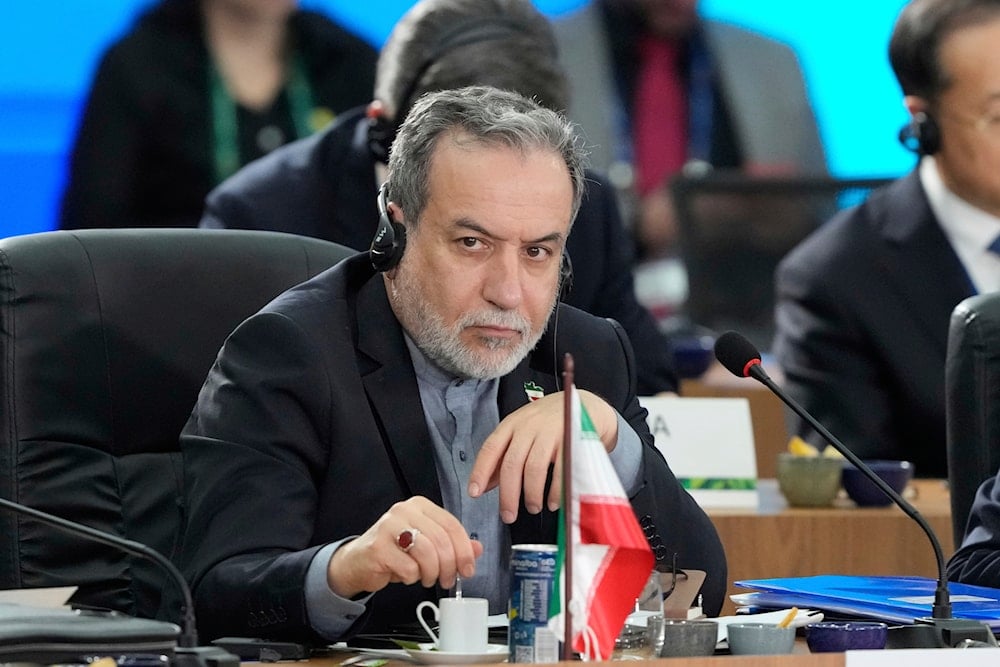E3 decision erodes IAEA talks, compels appropriate response: Araghchi
Iran, once again, warns the E3 against a snapback move, slamming US and European actions over the nuclear deal as "immoral, unjustified, and unlawful."
-

Iranian Foreign Minister Abbas Araghchi attends the 17th annual BRICS summit in Rio de Janeiro, Sunday, July 6, 2025 (AP)
Iranian Foreign Minister Abbas Araghchi issued a stern warning to the E3 countries, Germany, the United Kingdom, and France, after they moved forward with instating the snapback mechanism against Iran and imposing sanctions against it.
"Acting on behalf of Israel and the U.S., the E3 have decided to maliciously pursue pressure on the Iranian people. This folly—which Iran has sternly warned against—is immoral, unjustified, and unlawful," the Iranian foreign minister wrote on X.
Acting on behalf of Israel and the U.S., the E3 have decided to maliciously pursue pressure on the Iranian people. This folly—which Iran has sternly warned against—is immoral, unjustified, and unlawful.
— Seyed Abbas Araghchi (@araghchi) August 29, 2025
Iran has cautioned that having been left out by the U.S. on all global…
Araghchi cautioned Europe that, after being sidelined by the US on global issues, even Ukraine on their own doorstep, it should not mistakenly see the snapback mechanism as leverage to gain relevance, warning that pursuing this path would irreversibly diminish the E3's influence.
"Disturbingly, the European troika is now framing its reckless gambit as an endeavour to 'advance diplomacy'," he added.
Araghchi reminded in his post that he personally held talks with the US over the past decades and emphasized that Iran engaged in five rounds of indirect nuclear talks before "Israel" launched its war on Iran on the eve of the sixth round of negotiations.
Europe's 'repugnant' conduct
"It is repugnant for Europe to now accuse Iran of having left the table and spurning dialogue. The reality is that we are at a point where the West cannot even guarantee that it will cease further unlawful military strikes on my people while negotiations are held," the top Iranian diplomat stated.
Araghchi asserted that the European troika's actions unfairly punish the victim while rewarding the offender. He placed the blame for the current situation squarely on the US and Europe, reminding them that it was Washington, not Tehran, that unilaterally abandoned the nuclear deal in 2018 and reinstated punishing sanctions.
Furthermore, he stated that Europe failed in its obligation to counteract the economic damage caused by the US withdrawal. He added that rather than fulfilling its own commitments by Transition Day in October 2023, Europe instead chose to impose new, illegal sanctions on Iran's civil aviation and shipping sectors.
Snapback mechanism only damages diplomacy
"As I have made abundantly clear, the E3's decision will have significant adverse impacts on diplomacy. It will severely undermine the ongoing dialogue between Iran and the IAEA. It will also compel an appropriate response," Iran's FM said in his post.
Araghchi further warned that Europe's chosen path, if left unchecked, will severely damage the UN Security Council's credibility, as invoking the snapback mechanism without a legal basis undermines confidence in its decisions and jeopardizes international peace and security, making it imperative for the Council and the world to finally say "ENOUGH".
On his part, Mohammad Mokhber, an advisor to the Leader of the Islamic Revolution, reacted on X to the European troika's intention to trigger the snapback mechanism, writing that its activation lacks a legal basis and will only lead to more complicated diplomatic circumstances.
Mokhber added that such a move would not affect the firm determination of the Islamic Republic of Iran to preserve its independence and progress.
Oil Ministry’s specialized team ready to plan, adapt
Also commenting on the snapback activation, Iran’s Oil Minister Mohsen Paknejad acknowledged that while this step could impose limits on oil sales, the country is not powerless in facing these challenges.
Speaking to ISNA, Paknejad highlighted that Iran’s oil industry has gained valuable experience in bypassing restrictions and sustaining oil sales over recent years. He added that the Ministry’s specialized team is ready to plan and adapt to ensure continuous exports under various sanction conditions.
Addressing the potential impact of snapback measures on Iran’s oil market, he said, “Snapback could shift conditions in ways that require new strategies, but we are not hand-tied by these limitations and will make every effort to counter them.”
On production figures, Paknejad noted that over the past year, Iran has added an average of 127,000 barrels per day to its crude oil production capacity.
Referring to the targets of the Seventh Development Plan, he stated that Iran’s crude oil capacity is aimed to reach around 4.58 million barrels per day.

 4 Min Read
4 Min Read








